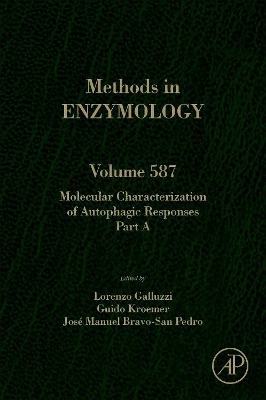
Molecular Characterization of Autophagic Responses Part A
Academic Press Inc (Verlag)
978-0-12-809675-8 (ISBN)
Autophagy is an evolutionarily conserved mechanism for the lysosomal degradation of superfluous or dangerous cytoplasmic entities, and plays a critical role in the preservation of cellular and organismal homeostasis. Monitoring the biochemical processes that accompany autophagy is fundamental for understanding whether autophagic responses are efficient or dysfunctional.
Lorenzo Galluzzi is Assistant Professor of Cell Biology in Radiation Oncology at the Department of Radiation Oncology of the Weill Cornell Medical College, Honorary Assistant Professor Adjunct with the Department of Dermatology of the Yale School of Medicine, Honorary Associate Professor with the Faculty of Medicine of the University of Paris, and Faculty Member with the Graduate School of Biomedical Sciences and Biotechnology of the University of Ferrara, the Graduate School of Pharmacological Sciences of the University of Padova, and the Graduate School of Network Oncology and Precision Medicine of the University of Rome “La Sapienza. Moreover, he is Associate Director of the European Academy for Tumor Immunology and Founding Member of the European Research Institute for Integrated Cellular Pathology. Galluzzi is best known for major experimental and conceptual contributions to the fields of cell death, autophagy, tumor metabolism and tumor immunology. He has published over 450 articles in international peer-reviewed journals and is the Editor-in-Chief of four journals: OncoImmunology (which he co-founded in 2011), International Review of Cell and Molecular Biology, Methods in Cell biology, and Molecular and Cellular Oncology (which he co-founded in 2013). Additionally, he serves as Founding Editor for Microbial Cell and Cell Stress, and Associate Editor for Cell Death and Disease, Pharmacological Research and iScience. Guido Kroemer got his M.D. in 1985 from the University of Innsbruck, Austria, and his Ph.D. in molecular biology in 1992 from the Autonomous University of Madrid, Spain. He is currently Professor at the Faculty of Medicine of the University of Paris Descartes/Paris V, Director of the INSERM research team ‘Apoptosis, Cancer and Immunity’, Director of the Metabolomics and Cell Biology platforms of the Gustave Roussy Cancer Campus, and Practitioner at the Hôpital Européen George Pompidou (Paris, France). He is also the Director of the Paris Alliance of Cancer Research Institutes (PACRI) and the Labex 'Immuno-Oncology'. Dr. Kroemer is best known for the discoveries that mitochondrial membrane permeabilization constitutes a decisive step in regulated cell death; that autophagy is a cytoprotective mechanism with lifespan-extending effects; and that anticancer therapies are successful only if they stimulate tumour-targeting immune responses. He is currently the most-cited cell biologist in Europe (relative to the period 2007-2013), and he has received the Descartes Prize of the European Union, the Carus Medal of the Leopoldina, the Dautrebande Prize of the Belgian Royal Academy of Medicine, the Léopold Griffuel Prize of the French Association for Cancer Research, the Mitjavile prize of the French National Academy of Medicine and a European Research Council Advanced Investigator Award. Jose Manuel Bravo-San Pedro is currently a researcher at the Department of Physiology of the Complutense University of Madrid thanks to a Ramon y Cajal contract grant. He got his Ph.D. in biochemistry, cellular biology and genetics from the University of Extremadura (Caceres, Spain) in 2011, and he did a post-doctoral stage in the laboratory of Prof. Guido Kroemer. His main research interests have always been linked to autophagy, addressing this cellular process associated with neurodegenerative diseases or cancer and recently obesity and specifically related to problems in the correct functioning of the cilium. He is co-inventor of two patents and co-author of 110 publications indexed in PubMed in prestigious international journals, with h-index 45 and 23768 cites (Dec 2022).
1. Correlative Live Cell and Super Resolution Imaging of Autophagosome Formation 2. Quantifying Autophagic Structures in Mammalian Cells Using Confocal Microscopy 3. The Use of DQ-BSA to Monitor the Turnover of Autophagy-Associated Cargo 4. Turnover of Lipidated LC3 and Autophagic Cargoes in Mammalian Cells 5. High-Throughput Quantification of GFP-LC3+ Dots by Automated Fluorescence Microscopy 6. Use of pHlurorin-mKate2-human LC3 to Monitor Autophagic Responses 7. Production of Human ATG Proteins for Lipidation Assays 8. Investigating Structure and Dynamics of Atg8 Family Proteins 9. Methods for Studying Interactions Between Atg8/LC3/GABARAP and LIR-Containing Proteins 10. Assessment of Posttranslational Modifications of ATG proteins 11. Tagged ATG8-Coding Constructs for the In Vitro and In Vivo Assessment of ATG4 Activity 12. Measurement of the Activity of the Atg4 Cysteine Proteases 13. Crystallographic Characterization of ATG Proteins and Their Interacting Partners 14. Dynamics of Atg5–Atg12–Atg16L1 Aggregation and Deaggregation 15. Fluorescent FYVE Chimeras to Quantify PtdIns3P Synthesis During Autophagy 16. Quantification of Phosphatidylinositol Phosphate Species in Purified Membranes 17. Mass Assays to Quantify Bioactive PtdIns3P and PtdIns5P During Autophagic Responses 18. Fluorescence-Based Assays to Analyse Phosphatidylinositol 5-Phosphate in Autophagy 19. Ultrastructural Characterization of Phagophores Using Electron Tomography on Cryoimmobilized and Freeze Substituted Samples 20. A Simple Cargo Sequestration Assay for Quantitative Measurement of Nonselective Autophagy in Cultured Cells 21. In Vitro Reconstitution of Autophagosome–Lysosome Fusion 22. In Vitro Reconstitution of Atg8 Conjugation and Deconjugation 23. Study of ULK1 Catalytic Activity and Its Regulation 24. Evaluating the mTOR Pathway in Physiological and Pharmacological Settings 25. Methods to Study the BECN1 Interactome in the Course of Autophagic Responses 26. In Vitro Characterization of VPS34 Lipid Kinase Inhibition by Small Molecules 27. Methods to Study Lysosomal AMPK Activation 28. Allosteric Modulation of AMPK Enzymatic Activity: In Vitro Characterization 29. Assessing the Catalytic Activity of Transglutaminases in the Context of Autophagic Responses
| Erscheinungsdatum | 28.02.2017 |
|---|---|
| Reihe/Serie | Methods in Enzymology |
| Verlagsort | San Diego |
| Sprache | englisch |
| Maße | 152 x 229 mm |
| Gewicht | 1090 g |
| Themenwelt | Medizin / Pharmazie ► Medizinische Fachgebiete |
| Naturwissenschaften ► Biologie ► Biochemie | |
| Naturwissenschaften ► Biologie ► Mikrobiologie / Immunologie | |
| ISBN-10 | 0-12-809675-6 / 0128096756 |
| ISBN-13 | 978-0-12-809675-8 / 9780128096758 |
| Zustand | Neuware |
| Haben Sie eine Frage zum Produkt? |
aus dem Bereich


